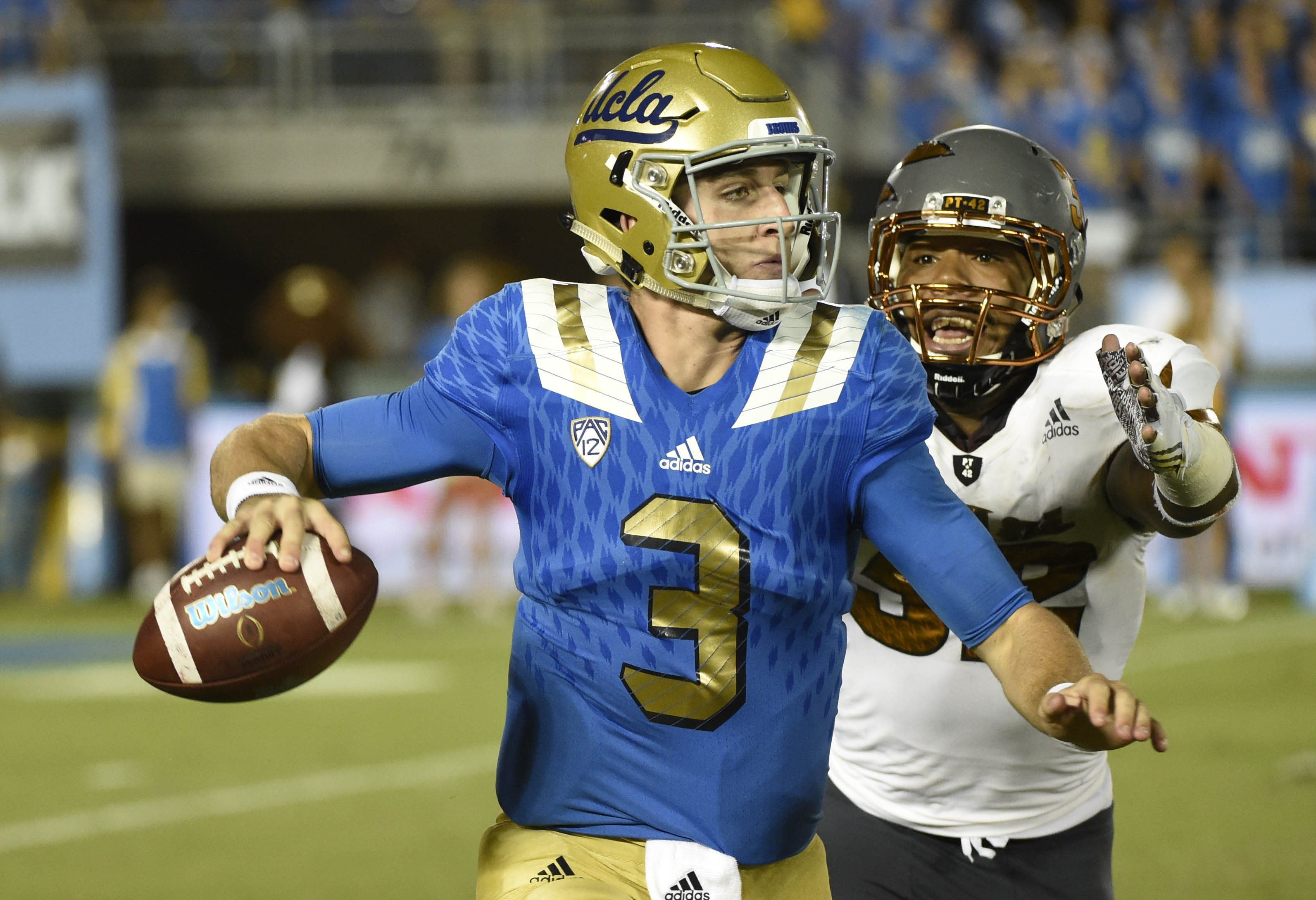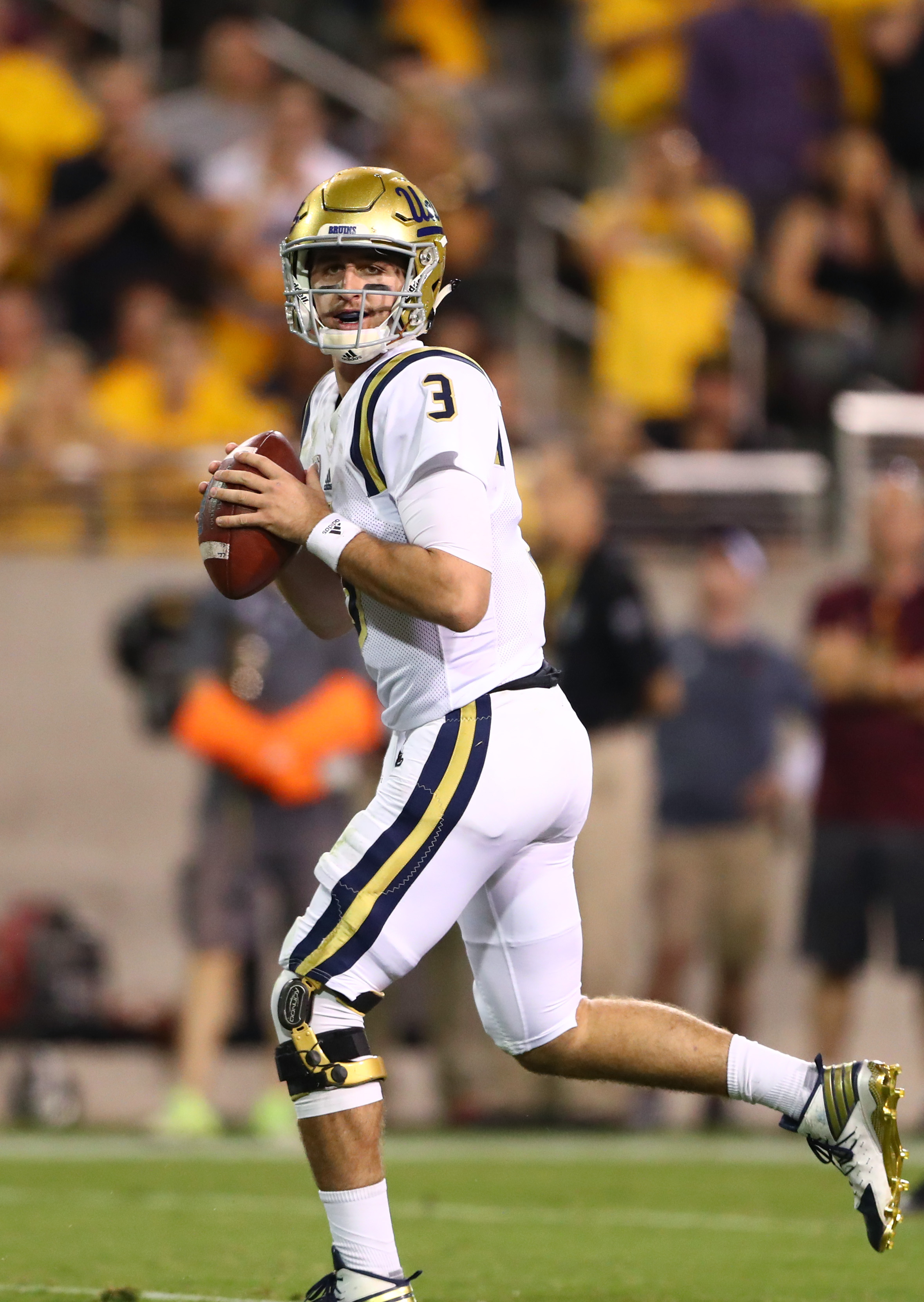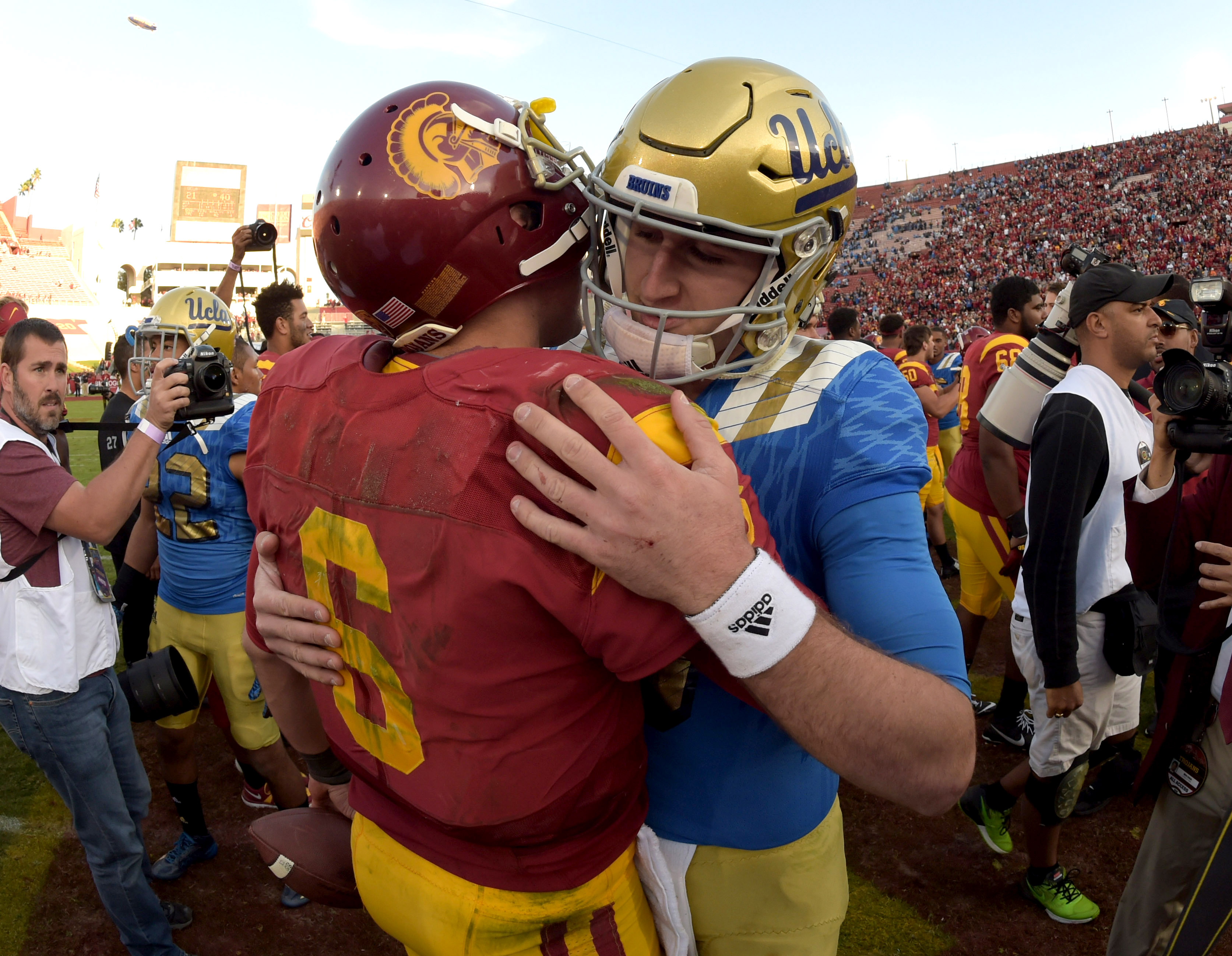
UCLA Football: Is Josh Rosen a sure-fire franchise quarterback?
In a recent piece for NFL.com, Bucky Brooks declared that there are no sure-fire franchise QBs in the 2018 class. Could UCLA's Josh Rosen prove him wrong?
Franchise quarterbacks are hard to find.
Having one could very well be the difference between playing in January and taking an early vacation. The only problem? There simply are not enough franchise caliber QBs.
Every year a number of young signal-callers enter the NFL with dreams of becoming the next great superstar, yet year after year numerous teams find themselves picking toward the top of the NFL Draft dreaming of selecting a player to turn their franchise around.
Players like Tom Brady, Aaron Rodgers and Drew Brees have led their respective teams to countless playoff berths over their decade spanning careers and returned home as Super Bowl champions.
There is no definitive definition of what exactly makes up a franchise quarterback, but it is fairly well accepted that at any given time there are only a dozen or so franchise quarterbacks in the NFL.
When a team invests a first-round draft pick in a quarterback, they want a player who can lead their team for years to come, and one whom they can build their squad, staff and playbook around. However, based on recent data, there are teams who would be happy just to get a consistent starter as a return on their investment.
Since 2012, there have been 18 QBs taken in the first round alone and 21 in the first 60 picks. These players have had very different careers, careers that can help to set up a basis for us to compare future prospects to.
While teams like the Seahawks and the Cowboys have found starting quarterbacks in the 3rd day of the NFL draft, these are the exception not the rule. If a team truly wants to optimize their chances of drafting a starting QB, they will typically be looking for one in the first round.
There are currently four quarterbacks that are getting early consideration to be first round caliber players. This piece will evaluate Josh Rosen, UCLA's junior signal-caller, against his peers, past and present, to see if he truly deserves to be a team's future starting quarterback.
Meet the Player
Josh Rosen has been a golden boy his entire life.
The son of a former gold medal ice dancer and figure skater, Rosen was groomed from a young age to be a star athlete.
Rosen grew up playing tennis against his future Emory University All-American sister Beatrice, and becoming a top-10 junior player in the process, before switching to football shortly before high school.
After enrolling in St. John Bosco High School in the fall of 2011 Josh spend the next four years of his life as a member of the Braves' varsity football team. Josh lead the varsity squad for 2012-2014 and amassed over 8,400 yards passing and 90 touchdowns in 43 games. These numbers, in addition to his athletic pedigree, made him incredibly sought after.
A consensus 5 star prospect, Rosen was the top ranked quarterback prospect in the nation by both Scout.com and Rivals.com, with scouts admiring his live arm, his pocket presence and his physical gifts at the position.
Dozens of teams showed interest during the recruitment process, with no less than 17 teams offering him a scholarship, but for Rosen it was never really a competition. After taking only one official college visit, Josh committed his services to UCLA, spurning the likes of Notre Dame, Alabama and crosstown-rival USC, to serve as the signal caller for Jim Mora's Bruins offense.
After enrolling a semester early, Josh Rosen dazzled fans, coaches and his fellow teammates in UCLA's spring program and became the conscientious starting quarterback for the Bruins as a true freshman.
As a true freshman Rosen would start all 13 games for UCLA, the first true freshman in university history to do so, and put up dazzling numbers, throwing for 3,670 yards and 23 touchdowns while leading the Bruins to a 8-5 record.
Rosen received near universal praise for his freshman campaign, receiving numerous accolades, like being named a Freshman All-American, and winning the Pac-12 Offensive Player of the Year award. He also received praise from his own head coach, who told Rich Eisen that Rosen was the best quarterback in the country in 2016, and would have been the first quarterback taken in the 2016 NFL Draft had he been eligible.
This showering of praise would go to Rosen's head, and he became a hot topic of for reporters for more than just his arm talent.
Josh would make national headlines when TMZ broke the story that Rosen had installed a $350 inflatable hot tub in his dorm room during the 2015 season. Trouble would again find Rosen in the spring of 2016, after making a 'provocative' fashion statement while golfing at the Trump National Golf Club in Rancho Palos Verdes, California.
After enduring an eventful offseason, Rosen returned to LA for the 2016 season, ready to continue UCLA's resurgence in the Pac-12.
The UCLA squad opened its season with a 3-2 record highlighted by Rosen's strong performance. However, the hype would be short-lived after Josh suffered a season ending shoulder injury in the team's Week 6 loss to Arizona State. UCLA would finish the season with a disappointing 4-8 record, going 1-6 in Rosen's absence.
Now fully healthy, Rosen will again lead the UCLA Bruins in what could very well be his final season in Los Angeles. If Josh is able to continue to progress as a player on the field without getting into trouble off the field this could be the season that Rosen cements himself as a future first round pick.

October 1, 2016; Pasadena, CA, USA; UCLA Bruins quarterback Josh Rosen (3) throws against the Arizona Wildcats during the second half at Rose Bowl. Mandatory Credit: Gary A. Vasquez-USA TODAY Sports
Measureables
Josh Rosen is listed at 6-foot-3 and 218 pounds.
Of the 21 quarterbacks taken in the top 60 picks since 2012 Rosen, is tied for the fourth-shortest. While Rosen isn't as short as say Johnny Manziel, who's listed at 5-foot-11, he is slightly shorter than the prototypical NFL QB.
Of the 16 highest-ranked quarterbacks of 2016 according to Pro Football Focus, only seven stood 6-foot-3 or shorter. Of the seven, only one quarterback, Aaron Rodgers, was selected in the first round. While it is telling that players 6-foot-3 and shorter can still be incredibly successful in the NFL, it is interesting to note that only one was a first-round pick, and a late one at that.
Teams shy away from players who are too short in the first round of the draft because of fears that their lack of stature will impact their ability to see the field once the ball in snapped.
Similarly teams often shy away from players who weigh less than 220 pounds.
Of the 21 QBs taken in the top 60 picks of the NFL draft since 2012, only six weigh less than Rosen.
NFL teams routinely pass over light quarterbacks because of fear of injury. A quarterback like Robert Griffin III, a dynamic athlete while leading Baylor 218 pounds, missed major stretches of his pro career as a result of consistent injury. In five NFL seasons, the former No. 2 overall selection only appeared in 42 games.
Of the top 16 NFL quarterbacks during the 2016-2017 season, only four weighed less than 218 pounds, and none was selected in the first round of the NFL draft. Simply put, it would appear that pro teams typically are weary of selecting a slight quarterback with a high pick. While thinner quarterbacks typically run fast 40-yard dashes and can be dynamic athletes, they are also far more likely to get injured and thus become unreliable.
These quarterbacks can often gain muscle mass as they enter professional conditioning programs, but the additional weight can take away some of the speed and elusiveness that often give small quarterbacks their competitive advantage.
Josh has already experienced one season ending injury, a broken collarbone, during his sophomore season at UCLA, and his ability to remain healthy over a 16 game season in the NFL will be paramount to his success as a pro.
Fortunately for Rosen he not a traditional dual threat college quarterback, instead doing the majority of his damage with his arm from the pocket. While he may only weight 218 pounds at the time of this article, there is no reason that he couldn't eventually add 10-15 pounds and remain a deadly pocket passer.
College Production
Josh Rosen is a game changer. Literally.
When Rosen arrived on UCLA's campus in the spring of 2015 he received a playbook filled with traditional spread offensive concepts designed to take advantage of former starting quarterback Brett Hundley's skill set.
More from Saturday Blitz
Spread offenses are predicated on spacing out the field with multiple receivers to quickly attack opposing defenses horizontally across the field. If the play falls apart, or no receivers get open, spread quarterbacks will typically take off in an attempt to run for a first down. This offensive scheme works best to highlight a quarterback's natural athleticism and can cover up a players lack of elite arm talent and decision making abilities.
Rosen was able to succeed in this scheme but it became apparent to head coach Jim Mora, a former NFL head coach, that sticking strictly to spread concepts wouldn't properly use Rosen's natural talents.
Josh Rosen was the number one rated quarterback coming out of high school, but unlike many of his peers Josh is a pure pocket passer, in the vein of Eli Manning. Rosen does the vast majority of his damage with his arm while planted inside the pocket, as opposed to being swung out on bootlegs or performing zone read plays. In 19 college games Josh has rushed for negative-57 yards on 59 attempts while being sacked 28 times.
Even though Rosen won't be making highlight reel 40 yards runs anytime soon he does have the ability to dazzle as a passer.
Rosen has an absolute cannon for an arm. He can make any throw in the book and does so with the touch, anticipation and velocity of a seasoned pro. Josh will routinely throw into double, triple and even quadruple coverage and deliver the ball directly into his receiver's hands.
In order to highlight Rosen's skill set, coach Mora began to incorporate more traditional pro-style vertical concepts into the Bruin's passing game. A typical vertical passing offense is much more complex to operate than its spread counterparts. Plays require much more time to set up, due to the nature of running deep routes, and need a quarterback who can read a defense and adjust the play accordingly, both highlights of Rosen's game.
In 2016 UCLA committed fully to running a pro-style offense. After taking almost every snap in 2015 from the shotgun, Rosen found himself taking snaps from under center, and had the freedom to call audibles from the line of scrimmage. While Rosen only played in six games, and there were obvious growing pains across the offense as players adjusted to such a drastic change of scheme, Josh looked like a natural pocket passer.
In his two season of college ball Josh has shown NFL teams that he can thrive in a variety of offensive schemes with ease. Rosen's game film shows everything scouts craze from a franchise quarterback, from reading defenses and making adjustments, to attacking defenses from all over the field.
While he probably won't test particularly well at the NFL combine, Josh Rosen is more quarterback than athlete, and a great one at that.
Scouting Report
When evaluating Josh Rosen's game film it becomes incredibility clear why scouts love him.
This play from Josh Rosen's freshman season shows off his supreme arm talent. After taking the snap out of the shotgun, Rosen fakes the hand-off to his runningback Paul Perkins and instead commits to throwing a play-option pass. Rosen drops back 5 steps, sets his feet and launches the ball 50 yards in the air directly into the hands of his receiver.
Not only does this throw show off Josh's impressive arm strength, but it also highlights Rosen's elite ability to thread the needle and read a defense. Josh drops the ball over his receiver's left shoulder, making it impossible for the cornerback covering him to make a play on the ball. After seeing that there was no single high safety camping in the middle of the field, Rosen leads his receiver between the hash marks, ensuring him the open space needed to elude his defender and score the touchdown untouched.
On this play while still in high school, Rosen breaks down his own 60-yard touchdown pass. His understanding of the responsibilities of each receiver, and exactly how to best attack the opposing defense based on their movements after the snap is impressive for a college quarterback, let alone a junior in high school.
This play, again broken down by Josh, shows that even at a young age he had a deep understanding of how to run an offense. In an age where quarterbacks graduate college without knowing the difference between cover 2 and cover 3 it's increasingly rare to find a quarterback who can draw up a sophisticated play action readzone play.
While Rosen is often knocked for his lack of athleticism, he isn't a statue in the pocket. On this highlight, Rosen's top reads are covered on a quick slant play and instead of standing in the pocket waiting for a receiver to get open, Josh instead takes off to make a play himself. He spots a hole in the defensive line and takes the ball up B gap before cutting it to the sideline and diving into the endzone for a touchdown.
While the run isn't particularly flashy, it does show that Josh can make unexpected plays with his feet if needed with quality results.
While he isn't as athletic as quarterbacks like Marcus Mariota or Lamar Jackson, he is much closer to Matt Ryan than Phillip Rivers.
Final Thoughts
Josh Rosen is a throwback player.
In an age of spread offenses with option quarterbacks, Rosen is an old school pocket passer, but with a modern twist.
Josh is an incredibly smart player who understands the ins and outs of being a quarterback, and has shown the ability to operate out of multiple offensive formations with ease. He is one of the few quarterbacks in college football who has the freedom and understanding to read an opposing team's defensive alignment and make changes to the play at the line of scrimmage.
Rosen also has a strong arm, poise in the pocket, and and exudes an air of confidence that inspires the players around him. While some QBs may shy away from throwing the ball deep for fear of throwing an interception, Rosen instead trusts his arm and his eyes, and airs the ball out frequently. While he does end up throwing his fair share of interceptions, throwing 16 in 19 games, Rosen does not get discouraged and remains aggressive on subsequent drives.
While teams will want Josh to bulk up at the pro level to help him survive the relentless assault that is the NFL, the biggest red flag teams will have to overcome with Rosen is his off the field concerns.
Scouts have already started to classify Rosen as "entitled" and fear that his outbursts online and off the field could hinder his success on the field. Rosen has already stated in an interview early in his UCLA career that he views football as a means to an end, which could also cause coaching staffs to fear his commitment to the game and becoming great.
Additionally there have been concerns that Rosen's ego can get in the way of his coachability. At a 2014 quarterback camp, Rosen clashed with instructor Trent Dilfer after taking liberties with the playbook.
If Rosen can remain focused on football he very well could be the best quarterback in this draft class. He is athletic in a Derek Carr way, and like Carr, his experience in college will allow him to become a starter early in his professional career. Josh has played in multiple offensive schemes and scouts will know exactly what they are getting on the field based on his game film.
Rosen's off the field concerns however could be a red flag for some NFL teams. After watching former first-round picks like Johnny Manziel have pro careers get derailed by off the field issues, a player like Rosen may scare away teams that lack strong locker room culture.
Simply put, while Josh Rosen may be a risk he is a gamble worth taking.















